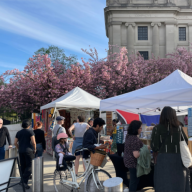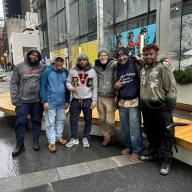District Attorney Charles Hynes filed indictments against two East New York gangs last week, ensuring that the members of the groups known as the Rockstarz and the Very Crispy Gangsters will be spending the next several decades in prison.
Investigators linked the gang members to a slew of crimes, including assaults, the shooting of innocent victims, and murder. But the suspects made it easy for police to follow their criminal comings and goings, since they Tweeted and put on Facebook every vicious move, the DA explained.
“Using Facebook for anti-social networking, these thugs even ‘friended’ their enemies, so they could post violent threats to rival gang members,” Hynes said.
The indictments charge that the two gangs engaged in a three-year war that began with the shooting of Very Crispy gang member Taquan “Tay Weez” Crandell, back in September 2009.
In addition to the Crandell shooting, the indictment against the Rockstarz charges members with the shooting death of Very Crispy member Namadi Simpson, on April 9, 2010, and Johnny Santiago, who was beaten to death on June 6, 2011, while in a part of East New York the Rockstarz claimed was their territory.
Prosecutors said that members of both gangs made and accepted “friend” requests among their rivals’ gangs, so they could post threats to one another. The indictment charges that at least one such comment made reference to Simpson’s murder. After Santiago’s murder, Rockstarz members posted comments, including, “Rockstarz are up 3–0” on Facebook, according to the indictments. Other Rockstarz members posted Facebook photos of Very Crispy Gangsters members featuring threatening captions, the indictment charges.
The indictment also charges that the gangs worked together to prevent witnesses from testifying against members of either gang.
In light of these arrests, investigators said they will be paying more attention to gang members’ Facebook pages.
“Detectives used both social media as well as good old-fashioned police work to track these killers,” NYPD Police Commissioner Ray Kelly said.
Ivory smuggler pleads guilty
A man accused of smuggling African elephant ivory to the United States is facing 20 years in prison now that he’s pleaded guilty to the charges against him.
Victory Gordon, the 68-year-old owner of a Philadelphia African art store, admitted to a Brooklyn federal judge that he had smuggled more than a ton of elephant ivory into the U.S.
Gordon was arrested in July 2011, following the seizure of the elephant ivory from his store — one of the largest U.S. seizures of elephant ivory on record. As part of his plea agreement, Gordon has agreed to forfeit all of the seized ivory and $150,000.
The value of the ivory Gordon has agreed to forfeit is estimated to be in excess of $400,000, officials said.
Illegal trade in African elephant ivory is a major threat to elephant populations in Africa, particularly in the hardest-hit poaching regions of West and Central Africa, where the ivory in this investigation originated.
African elephants are protected under the Convention on International Trade in Endangered Species of Wild Fauna and Flora, an international treaty to prevent species from becoming endangered or extinct due to international trade. The African elephant is also listed as a threatened species under the U.S. Endangered Species Act.
The global demand for elephant ivory led to devastating declines in the elephant population, particularly in the 1970s and 1980s. Despite international efforts to control the ivory trade and stop the killing of elephants, prices and demand remain high, causing continued elephant poaching and the flow of illegal ivory into the global marketplace.
“Gordon engaged in an illegal business that directly threatens a protected species,” Brooklyn U.S. Attorney Loretta Lynch said in a statement.
“Worldwide demand for illegal ivory continues to drive the plunder and exploitation of the African elephant population. This conviction sends a message that we are committed to investigating and prosecuting those who would stoke that demand by smuggling elephant ivory into the United States.”
Reach Deputy Editor Thomas Tracy at ttracy@cnglocal.com or by calling (718) 260-2525.




















